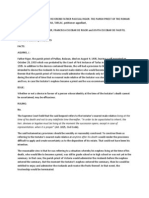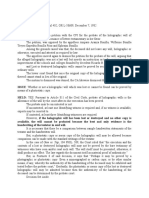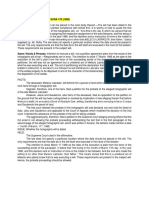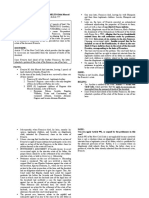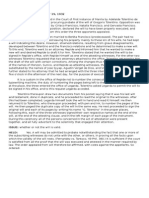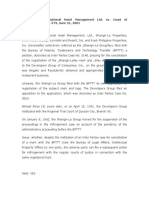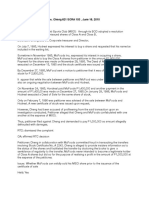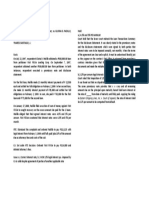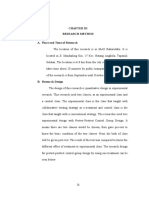Guerrero vs. Bihis Digest
Guerrero vs. Bihis Digest
Uploaded by
iwamawiCopyright:
Available Formats
Guerrero vs. Bihis Digest
Guerrero vs. Bihis Digest
Uploaded by
iwamawiOriginal Description:
Copyright
Available Formats
Share this document
Did you find this document useful?
Is this content inappropriate?
Copyright:
Available Formats
Guerrero vs. Bihis Digest
Guerrero vs. Bihis Digest
Uploaded by
iwamawiCopyright:
Available Formats
Guerrero vs. Bihis deed.
Such declaration is under oath and under pain of perjury, thus paving
521 SCRA 394, April 17, 2007 the way for the criminal prosecution of persons who participate in the
execution of spurious wills, or those executed without the free consent of the
Petitioner: Bella A. Guerrero testator. It also provides a. further degree of assurance that the testator is of a
Respondent: Resurrecion A. Bihis certain mindset in making the testamentary dispositions to the persons
instituted as heirs or designated as devise or legatees in the will.
DOCTRINES: An acknowledgement can only be made before a competent officer, that is
a lawyer duly commissioned as a notary public.
An acknowledgement taken outside the territorial limits of the officer’s jurisdiction is void
as if the person taking it were wholly without official character. Under the Notary Law, the jurisdiction of a notary public in the City of Manila
shall be coextensive with the said city. No notary shall possess authority to do
any notarial act beyond the limits of his jurisdiction. Hence, a notary public is
FACTS: authorized to perform notarial acts, including the taking of the
acknowledgements, within that territorial jurisdiction only. Any notarial act
On February 19, 1994, Felisa Tamio de Buenaventura, the mother of the parties, outside the limits of jurisdiction has no force and effect
died at the Metropoliatan Hospital in Tondo, Manila.
On May 24, 1994, Guerrero filed a petition to probate decedent’s last will and As pronounced in Tecson v. Tecson, an acknowledgement taken outside the
testament and her appointment as executrix in RTC QC. territorial limits of the officer’s jurisdiction is void as if the person taking it were
Respondent opposed the petition. Bihis contended that the will was not wholly without official character.
executed and attested as required by law, acknowledgement did not comply
with the requirement, and the signature of the testatrix was procured by fraud Since Atty. Directo was not a commissioned notary public for and in Quezon
and undue and improper pressure and influence by Guerrero. City, he lacked the authority to take the acknowledgment of the testatrix and
Eventually, the trial court appointed Guerrero and respondent withdrew her the instrumental witnesses. In the same vein, the testatrix and her witnesses
opposition, could not have validly acknowledged the will before him. Thus, Felisa Tamio
But on January 17, 2000, after petitioner presented evidence, respondent filed de Buenaventura’s last will and testament was, in effect, not acknowledged as
for a demurrer alleging that the petitioner’s evidence failed to establish that required by law. The acts of the testatrix, her witnesses, and Atty. Directo were
the will complied with Art. 804 and 805 of NCC. all void.
RULING OF THE LOWER COURTS: Disposition: SC affirmed decision of CA and denied probate of the will.
Trial court denied the probate of the will ruling that Art. 806 was not complied
with because the will was “acknowledged” by the testatrix and witnesses at
the testatrix’s residence in Quezon City before Atty. Macario O. Directo who
has a commissioned notary public for and in Caloocan City.
CA affirmed ruling by the trial court.
PETITIONER’S CONTENTION:
Guerrero contended that the fact that the notary public was acting outside his territorial
jurisdiction did not affect the validity of the notarial will.
ISSUE: Whether the will “acknowledged “ by the testatrix and the instrumental witnesses
before a notary public acting outside the place of his commission satisfy the
requirement under Art. 806 of the Civil Code
RULING + RATIO: NO
A notarial will that is not acknowledged before a notary public by the testator
and the instrumental witnesses is void and cannot be accepted for probate.
The acknowledgment of a notarial will coerces the testator and the
instrumental witnesses to declare before an officer of the law, the notary
public, that they executed and subscribed to the will as their own free act or
1
You might also like
- Fireball'S Heart: by Herbert PuchtaDocument4 pagesFireball'S Heart: by Herbert PuchtaMauro Velez75% (4)
- Ultramodern 5 - Ficha EditávelDocument1 pageUltramodern 5 - Ficha EditávelSilvio Marcelino de OliveiraNo ratings yet
- A Raisin in The Sun DLPDocument10 pagesA Raisin in The Sun DLPJane Macababbad Tungcul100% (1)
- 11 Baltazar vs. LaxaDocument1 page11 Baltazar vs. LaxaJoshua Erik MadriaNo ratings yet
- Acain Vs IacDocument7 pagesAcain Vs IacIvan Montealegre ConchasNo ratings yet
- NHA v. AlmeidaDocument2 pagesNHA v. AlmeidaRhev Xandra AcuñaNo ratings yet
- Ortega v. ValmonteDocument2 pagesOrtega v. ValmonteAnjNo ratings yet
- Dy Yieng Seangio Vs Hon ReyesDocument2 pagesDy Yieng Seangio Vs Hon ReyesFrancis Coronel Jr.100% (3)
- Alsua-Betts Vs CADocument1 pageAlsua-Betts Vs CABANanaispleetNo ratings yet
- Vda de Enriquez V AbadiaDocument2 pagesVda de Enriquez V AbadiaPam Ramos100% (1)
- Azuela V CA and CastilloDocument2 pagesAzuela V CA and CastilloGillian Calpito100% (2)
- Pro Line Sports Center, Inc. vs. Court of AppealsDocument3 pagesPro Line Sports Center, Inc. vs. Court of Appealsiwamawi100% (1)
- Victoria V Rigor Case DigestDocument2 pagesVictoria V Rigor Case DigesthistabNo ratings yet
- Rule 3 - Codoy vs. CalugayDocument2 pagesRule 3 - Codoy vs. CalugayErwin Bernardino100% (1)
- Alvarado v. GaviolaDocument3 pagesAlvarado v. GaviolaLucas Gabriel Johnson100% (1)
- Palacios V RamirezDocument2 pagesPalacios V RamirezMickey Rodent100% (1)
- Taboada V RosalDocument2 pagesTaboada V RosalMharey75% (4)
- Rosales vs. RosalesDocument2 pagesRosales vs. RosalesVloudy Mia Serrano PangilinanNo ratings yet
- Parish Priest of Victoria v. Rigor (89 Scra 493)Document1 pageParish Priest of Victoria v. Rigor (89 Scra 493)MhareyNo ratings yet
- Caneda V CA DigestDocument2 pagesCaneda V CA DigestBetson Cajayon100% (1)
- Gan v. YapDocument1 pageGan v. YapAnjNo ratings yet
- Rodelas v. AranzaDocument1 pageRodelas v. AranzaKrisha Marie CarlosNo ratings yet
- Testate Estate of Alipio Vs AbajaDocument2 pagesTestate Estate of Alipio Vs AbajaVikki Amorio100% (3)
- Dorotheo V CADocument2 pagesDorotheo V CAAnj100% (1)
- 74 Azaola v. SingsonDocument2 pages74 Azaola v. Singsonviva_33100% (1)
- Seangio Vs ReyesDocument6 pagesSeangio Vs ReyesIvan Montealegre ConchasNo ratings yet
- 24 Ortega Vs ValmonteDocument2 pages24 Ortega Vs ValmonteJoshua Erik MadriaNo ratings yet
- Digest Abangan V AbanganDocument2 pagesDigest Abangan V Abangansiya_ba_yun100% (2)
- Leonardo VS CaDocument1 pageLeonardo VS CaJoesil DianneNo ratings yet
- Mitra Vs Sablan GuevarraDocument2 pagesMitra Vs Sablan Guevarrasally dee67% (3)
- Gallanosa Vs ArcangelDocument4 pagesGallanosa Vs ArcangelwesleybooksNo ratings yet
- Baltazar Vs LaxaDocument2 pagesBaltazar Vs LaxaFrancis Ray Arbon Filipinas100% (2)
- Matias v. SaludDocument2 pagesMatias v. SaludNOLLIE CALISINGNo ratings yet
- Molo V MoloDocument3 pagesMolo V MoloNikki AndradeNo ratings yet
- Labrador Vs CADocument1 pageLabrador Vs CAdanielNo ratings yet
- Vicente B. Teotico vs. Ana Del Val, Etc.Document2 pagesVicente B. Teotico vs. Ana Del Val, Etc.Keeno GuevarraNo ratings yet
- De Borja v. Vda. de BorjaDocument1 pageDe Borja v. Vda. de Borjaviva_33100% (1)
- Sienes V EsparciaDocument2 pagesSienes V EsparciaGillian Calpito100% (1)
- Segunda Maria Nieva VDocument3 pagesSegunda Maria Nieva VPcl Nueva VizcayaNo ratings yet
- NERA v. RIMANDODocument1 pageNERA v. RIMANDOMhareyNo ratings yet
- Wills and Succession Batch 1Document29 pagesWills and Succession Batch 1Jeorge Ryan MangubatNo ratings yet
- Aznar V DuncanDocument2 pagesAznar V DuncanElah ViktoriaNo ratings yet
- Suroza v. Judge HonradoDocument1 pageSuroza v. Judge HonradoMhareyNo ratings yet
- In Re Probate of Will of Jose RiosaDocument2 pagesIn Re Probate of Will of Jose RiosaCyruz TuppalNo ratings yet
- 37 Molo v. Molo GR No. L-2538Document2 pages37 Molo v. Molo GR No. L-2538JC Hilario100% (1)
- Gonzales V CADocument2 pagesGonzales V CAKristine GarciaNo ratings yet
- Roxas Vs de Jesus Succession DigestDocument2 pagesRoxas Vs de Jesus Succession DigestCJNo ratings yet
- Vda. de Enriquez vs. Miguel Abadia, Et. Al.Document1 pageVda. de Enriquez vs. Miguel Abadia, Et. Al.MhareyNo ratings yet
- Arellano V Pascual (2010)Document2 pagesArellano V Pascual (2010)EM RG100% (2)
- Molo Vs MoloDocument1 pageMolo Vs MoloCrystalAlfonso-SiguenzaNo ratings yet
- CAYETANO vs. LEONIDAS (129 SCRA 524)Document1 pageCAYETANO vs. LEONIDAS (129 SCRA 524)MhareyNo ratings yet
- Morales Vs OlondrizDocument2 pagesMorales Vs OlondrizLloyd SanchezNo ratings yet
- Tolentino V FranciscoDocument2 pagesTolentino V FranciscoKarla EspinosaNo ratings yet
- Nuguid Vs Nuguid DIGESTDocument1 pageNuguid Vs Nuguid DIGESTJacquelyn AlegriaNo ratings yet
- Garcia Vs GatchalianDocument16 pagesGarcia Vs GatchalianHappy KidNo ratings yet
- Nepomuceno V CADocument2 pagesNepomuceno V CAKrisha Marie Carlos100% (2)
- Dela Merced v. Dela MercedDocument2 pagesDela Merced v. Dela MercedKaren Ryl Lozada Brito100% (1)
- Maloto Vs CA DigestDocument2 pagesMaloto Vs CA DigestAnne Aganap100% (2)
- Tolentino V FranciscoDocument1 pageTolentino V FranciscoSam FajardoNo ratings yet
- Sancho Vs AbellaDocument2 pagesSancho Vs Abellajerico kier nonoNo ratings yet
- Digest - Garcia V VasquezDocument2 pagesDigest - Garcia V VasquezMarian ChavezNo ratings yet
- Bella Guerero vs. Resureccion Bihis, G.R. No. 174144, April 17, 2007Document2 pagesBella Guerero vs. Resureccion Bihis, G.R. No. 174144, April 17, 2007Russell John HipolitoNo ratings yet
- Case List: Case NumberDocument4 pagesCase List: Case NumberprincessF0717No ratings yet
- Guerrero vs. BihisDocument1 pageGuerrero vs. BihisEdz Votefornoymar Del RosarioNo ratings yet
- Leonardo v. NLRCDocument2 pagesLeonardo v. NLRCiwamawi100% (1)
- City of Lapu-Lapu vs. Philippine Economic Zone AuthorityDocument5 pagesCity of Lapu-Lapu vs. Philippine Economic Zone AuthorityiwamawiNo ratings yet
- Asia Brewery, Inc. vs. Court of AppealsDocument5 pagesAsia Brewery, Inc. vs. Court of Appealsiwamawi100% (2)
- Pua v. DeytoDocument2 pagesPua v. DeytoiwamawiNo ratings yet
- Provincial Assessor of Marinduque vs. Court of AppealsDocument4 pagesProvincial Assessor of Marinduque vs. Court of AppealsiwamawiNo ratings yet
- Shangri-La International Hotel Management Ltd. vs. Court of AppealsDocument2 pagesShangri-La International Hotel Management Ltd. vs. Court of Appealsiwamawi100% (1)
- People v. SalasDocument1 pagePeople v. SalasiwamawiNo ratings yet
- Contex Corp. vs. CIRDocument1 pageContex Corp. vs. CIRiwamawiNo ratings yet
- Meralco Securities Corp. vs. SavellanoDocument2 pagesMeralco Securities Corp. vs. SavellanoiwamawiNo ratings yet
- Francisco Vs HRET: More Than Once Within A Period of One YearDocument1 pageFrancisco Vs HRET: More Than Once Within A Period of One YeariwamawiNo ratings yet
- Succession Cases1Document58 pagesSuccession Cases1iwamawiNo ratings yet
- Succession Cases1 PDFDocument42 pagesSuccession Cases1 PDFiwamawiNo ratings yet
- Nava vs. Peers Marketing CorporationDocument1 pageNava vs. Peers Marketing Corporationiwamawi100% (1)
- Joya Vs PCGGDocument1 pageJoya Vs PCGGiwamawiNo ratings yet
- Art. 82 LaborDocument3 pagesArt. 82 LaboriwamawiNo ratings yet
- Manila Jockey Club Inc.Document2 pagesManila Jockey Club Inc.iwamawiNo ratings yet
- BA NT & SA v. CADocument3 pagesBA NT & SA v. CAiwamawiNo ratings yet
- Makati Sports Club, Inc. vs. ChengDocument2 pagesMakati Sports Club, Inc. vs. Chengiwamawi100% (2)
- Wesleyan University-Philippines v. Maglaya, Sr.Document2 pagesWesleyan University-Philippines v. Maglaya, Sr.iwamawi100% (1)
- Pascual vs. Del Saz Orozco. 19 Phil. 82, March 17, 1911Document3 pagesPascual vs. Del Saz Orozco. 19 Phil. 82, March 17, 1911iwamawiNo ratings yet
- Pascual vs. Del Saz Orozco. 19 Phil. 82, March 17, 1911Document3 pagesPascual vs. Del Saz Orozco. 19 Phil. 82, March 17, 1911iwamawiNo ratings yet
- Tañada vs. AngaraDocument3 pagesTañada vs. AngaraiwamawiNo ratings yet
- Sps Toh v. Solid Bank CorporationDocument3 pagesSps Toh v. Solid Bank CorporationiwamawiNo ratings yet
- First Fil-Sin Lending Corp. v. PadilloDocument1 pageFirst Fil-Sin Lending Corp. v. PadilloiwamawiNo ratings yet
- Diño v. JardinesDocument1 pageDiño v. JardinesiwamawiNo ratings yet
- CA Agro-Industrial Development Corp. v. CADocument2 pagesCA Agro-Industrial Development Corp. v. CAiwamawi100% (1)
- 17 Points Manual Wilson CollegeDocument23 pages17 Points Manual Wilson CollegeDarshan BhansaliNo ratings yet
- Defamation LawsuitDocument178 pagesDefamation LawsuitWSETNo ratings yet
- Smart Blind Stick PDFDocument63 pagesSmart Blind Stick PDFSandeep38% (8)
- Dragon Kings Savage Worlds PDF Rules Supplement v2Document18 pagesDragon Kings Savage Worlds PDF Rules Supplement v2Tim RandlesNo ratings yet
- ACS580 Sales Presentation RevdDocument13 pagesACS580 Sales Presentation RevdThương NguyễnNo ratings yet
- Massage On Knee For PainDocument11 pagesMassage On Knee For PainAriv RahmawanNo ratings yet
- Inca Social StructureDocument19 pagesInca Social StructureRebecca Hefter CarmonaNo ratings yet
- Hot Rolled Steel ConnectionsDocument16 pagesHot Rolled Steel ConnectionsakhileshgojeNo ratings yet
- Activity 2 PsychstatsDocument7 pagesActivity 2 Psychstatsrjdc972No ratings yet
- Wages and Other Monetary Benefits Important Questions On LLM CourseDocument10 pagesWages and Other Monetary Benefits Important Questions On LLM CourseAaditha Karikalan100% (1)
- Eco Ges L1 s1 WK 1 Assessment + CurriculumDocument7 pagesEco Ges L1 s1 WK 1 Assessment + CurriculumSamir MokraniNo ratings yet
- Hofstede's 6 Cultural Dimensions of DiversityDocument4 pagesHofstede's 6 Cultural Dimensions of Diversityjossy MulingeNo ratings yet
- RVB + InternationDocument24 pagesRVB + InternationZXZXNo ratings yet
- USPDocument2 pagesUSPheocon857351No ratings yet
- FitchDocument4 pagesFitchHardeep SinghNo ratings yet
- Research Method A. Place and Time of ResearchDocument8 pagesResearch Method A. Place and Time of ResearchRhufu Rhumun FujiNo ratings yet
- Lyrics For Bale by Niniola FeatDocument4 pagesLyrics For Bale by Niniola FeatBabajide AdedapoNo ratings yet
- DLA-Vessels Guide E-Feb14 PDFDocument68 pagesDLA-Vessels Guide E-Feb14 PDFAnonymous xPBUKuVsj4No ratings yet
- Research Notes Chapter 2Document14 pagesResearch Notes Chapter 2Andrea de la SernaNo ratings yet
- UntitledDocument353 pagesUntitledUlises FerroNo ratings yet
- ECA2+ Tests Language Test 7B 2018Document5 pagesECA2+ Tests Language Test 7B 2018Cubi ArtNo ratings yet
- TransCAD - Exercise Session 1-4Document3 pagesTransCAD - Exercise Session 1-4Vincy VergheseNo ratings yet
- Methods and Approaches of Comparative Education: Prepared By: Jastine S. RafaelDocument23 pagesMethods and Approaches of Comparative Education: Prepared By: Jastine S. RafaelJewels Garcia100% (1)
- Terry Clifford Tibetan Psychiatry and Mental HealthDocument7 pagesTerry Clifford Tibetan Psychiatry and Mental HealthTau EzraNo ratings yet
- Blockbuster 1 Final TestDocument6 pagesBlockbuster 1 Final TestMaja HristovskaNo ratings yet
- Problem Solution Essay: LazinessDocument1 pageProblem Solution Essay: LazinessPaul Vincent LauretaNo ratings yet
- Descent.dialectic.ebookDocument249 pagesDescent.dialectic.ebookFelipe TauferNo ratings yet












